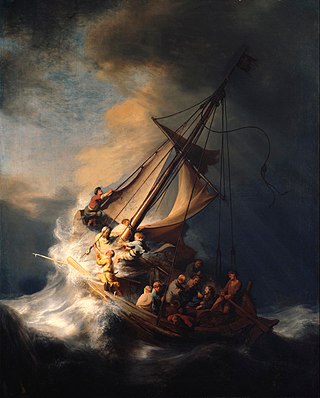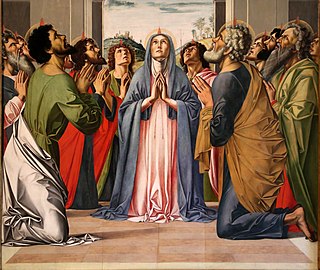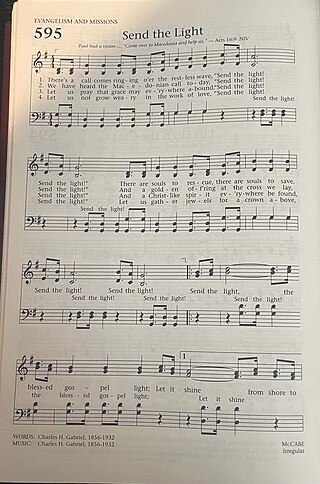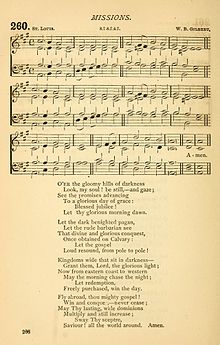
William Williams, Pantycelyn, also known as William Williams, Williams Pantycelyn, and Pantycelyn, is generally seen as Wales's premier hymnist. He is also rated among the great literary figures of Wales, as a writer of poetry and prose. In religion he was among the leaders of the 18th-century Welsh Methodist revival, along with the evangelists Howell Harris and Daniel Rowland.

"Love Divine, All Loves Excelling" is a Christian hymn by Charles Wesley on Christian perfection. Judging by general repute, it is among Wesley's finest. Judging by its distribution, it is also among his most successful.

"For All the Saints" was written as a processional hymn by William Walsham How, who was ultimately the Anglican Bishop of Wakefield. The hymn was first printed in Hymns for Saints' Days, and Other Hymns, by Earl Nelson, 1864.

"Christ the Lord Is Risen Today" is a Christian hymn associated with Easter. Most of the stanzas were written by Charles Wesley, and the hymn appeared under the title "Hymn for Easter Day" in Hymns and Sacred Poems by Charles and John Wesley in 1739. The hymn eventually became well known for the "Alleluia" sung as a melisma after each line, which was added by an unknown author, probably to fit the commonly used hymn tune, "Easter Hymn". It remains a traditional processional hymn on Easter Sunday.

"Eternal Father, Strong to Save" is a British hymn traditionally associated with seafarers, particularly in the maritime armed services. Written in 1860, its author, William Whiting, was inspired by the dangers of the sea described in Psalm 107. It was popularised by the Royal Navy and the United States Navy in the late 19th century, and variations of it were soon adopted by many branches of the armed services in the United Kingdom and the United States. Services who have adapted the hymn include the Royal Marines, Royal Air Force, the British Army, the United States Coast Guard, United States Marine Corps and the United States Space Force, as well as the navies of many Commonwealth realms. Accordingly, it is known by many names, variously referred to as the Hymn of His Majesty's Armed Forces, the Royal Navy Hymn, the United States Navy Hymn, and sometimes by the last line of its first verse, "For Those in Peril on the Sea". The hymn has a long tradition in civilian maritime contexts as well, being regularly invoked by ship's chaplains and sung during services on ocean crossings.
Cwm Rhondda is a popular hymn tune written by John Hughes (1873–1932) in 1907. The name is taken from the Welsh name for the Rhondda Valley.
"I'll Fly Away" is a hymn written in 1929 by Albert E. Brumley and published in 1932 by the Hartford Music company in a collection titled Wonderful Message. Brumley's writing was influenced by the 1924 secular ballad, "The Prisoner's Song".

"The Hymn of Joy" is a poem written by Henry van Dyke in 1907 in being a Vocal Version of the famous "Ode to Joy" melody of the final movement of Ludwig van Beethoven's final symphony, Symphony No. 9.
The God of Abraham Praise is a Christian adaptation of the well known Jewish hymn "Yigdal", loosely translated and Christianised by the evangelist Thomas Olivers after a visit to the Great Synagogue of London in 1770. It was first published in 1772. The title of the hymn was based on a verse in the Book of Exodus: "I am the God of thy Father, the God of Abraham".
"Crown Him with Many Crowns" is an 1851 hymn with lyrics written by Matthew Bridges and Godfrey Thring and sung to the tune 'Diademata' by Sir George Job Elvey. The hymn appears in many hymnals.

"Take Up Thy Cross, The Saviour Said" is an American Christian hymn written by Charles W. Everest. It was originally a poem published in 1833 but was later altered to become a hymn. It was then edited by English hymnwriter Sir Henry Baker for inclusion in the Church of England's Hymns Ancient and Modern hymnal.

"Sun of Unclouded Righteousness" is a little-known 1758 Christian hymn written by Charles Wesley, the brother of John Wesley, the founder of Methodism. It was written as an intercessory hymn praying for the salvation of Muslims and calls for their conversion to Christianity. It had fallen out of use by around 1880.
"At the Name of Jesus" is an 1870 hymn with lyrics written by Caroline Maria Noel.
"The Strife is O'er, the Battle Done" is a Christian hymn that is traditionally sung at Easter to celebrate the Resurrection of Jesus. It was originally a 17th-century Latin hymn, "Finita iam sunt proelia"; the popular English-language version is an 1861 translation by the English hymnwriter Francis Pott.

"Come Down, O Love Divine" is a Christian hymn usually sung for the festival of Pentecost. It makes reference to the descent of the Holy Spirit as an invocation to God to come to into the soul of the believer. It is a popular piece of Anglican church music and is commonly sung to the tune "Down Ampney" by Ralph Vaughan Williams.
"Let us break bread together" is a traditional Christian hymn. Its melody is searching, simple, major key, and has simple lyrics.

"Send the Light" is a hymn written in 1890 by American composer Charles H. Gabriel. The hymn was the first composed by Gabriel, who would later compose multiple famous hymns, such as "His Eye Is on the Sparrow" and "Will the Circle be Unbroken?".
"Thy Strong Word did Cleave the Darkness" is a Lutheran hymn written by Martin H. Franzmann and set to the tune of Ebenezer by Thomas John Williams.









